Is Ubuntu committed to free software?
Of course we are! At least according to our philosophy.
Still, many people don't think that Ubuntu is truly committed to free software in practice. I raised an interesting debate which took place on the Anarchism Reddit about whether it is better to be a purist or not. It started out by talking about Facebook and moved on to Ubuntu. The purist side made a very good argument with this:
If Ubuntu made a point of saying how non-free software was bad, and offered ways to easily purge all non-free software from one's system, that would be different. But they don't.This sentiment seems very reasonable to me, and people who feel this way can and should be our allies. The concerns are valid and not difficult to appease, so to act in accordance with our philosophy, we should make a couple simple changes to Ubuntu:
- Offer a way to easily purge all non-free software from one's system.
- This would require supporting the Linux-libre kernel (it doesn't have to be default, but the option should be available)
- Make a point of saying why and how non-free software was bad, but also why the option is given to install it
- This would need to be shown every time Ubuntu recommends proprietary software like restricted drivers
Simple as that! I'm sending an email to the devel-dicuss list now.
For those interested in the "to be or not to be a purist" debate, the crux of the argument for me, as someone who does support Ubuntu, is here:
http://www.reddit.com/r/Anarchism/comments/c7vfw/to_be_or_not_to_be_a_purist/c0qunme
Why Ubuntu LoCo's should move to LibrePlanet
In the debate over whether it is worth supporting projects like Ubuntu which are not purely free software, my opinion thus far remains that Ubuntu does help further the free software movement. Arguments against this are welcome, but that is a discussion for a future post. The reason that Ubuntu's local community teams should move to LibrePlanet is because having one of the worlds strongest FLOSS advocacy networks centered around one piece of software and sponsored by one company is a disservice to the greater free software community.
I have been heavily involved in Ubuntu advocacy for years, but for a while now, i've been considering the prospect of local teams operating independent of Canonical. This would not be a move to abandon Ubuntu, but simply to open up more possibilities and reach our full potential. Most people in LoCos are not loyal to Ubuntu, but to free software (aka open source). We are united by a set of ideals and work together to promote software which helps further these ideals. Why then, must all of our advocacy revolve around one GNU+Linux distribution? There are two main reasons for why it currently does.
Firstly, because Ubuntu is seen by most people as the best way to introduce new people to a (mostly) free desktop environment. It is certainly much easier to simply promote one operating system than a family of them. Still, this is no reason to limit ourselves. A team not entirely exclusive to Ubuntu can just as easily choose to promote Ubuntu exclusively for events aimed at the general public. Ubuntu may be the best now, but if something better came along or if Ubuntu went downhill, we should be able and ready to adapt. Being an Ubuntu LoCo does not provide this flexibility.
Secondly, because the infrastructure is there. Canonical provides a wiki and mailing lists to their teams and in exchange, the teams work for them, albeit loosely, as part of the Ubuntu LoCo project, under its name and banner. Canonical also provides printed install discs to officially approved teams, but there is no reason why Canonical should not provide sponsorship to any team of people who will be promoting Ubuntu. It's mutually beneficial. In the meantime, to continue receiving materials only provided to officially approved teams, LoCo's can continue to operate alongside LibrePlanet groups. This isn't all to say that Canincal has been working to actively lock teams in, but this is the effect it now has. Creating the LoCo project, providing the structure needed to establish global network of local advocacy teams, was a great service, but the time has come to grow beyond its current scope.
LibrePlanet is inspired by Ubuntu's LoCo Project, but it's instead organized around ideals, not any particular piece of software. Surely there are some who only care about what tools work best, but let's not forget the ideals which made these better tools possible. Most of us imagine a world where these ideals are universal and see an incredible amount of potential in that. LibrePlanet isn't yet another social group for GNU+Linux users, but a team of activists. These groups are more open to users of any free software who may be interested in advocacy. Sponsorship could come from Canonical, Mozilla, or whoever. Isn't this much more in line with the nature of FLOSS?
Being a LoCo does in many ways lock you in to promoting Ubuntu. You may promote other software and welcome users of other distros, but by their very title, LoCo teams exist for Ubuntu. The very reason i began taking this idea seriously is because some non-Ubuntu users wanted to get involved with an event organized by my local community team, but did not want to work under an Ubuntu banner (literally). I don't blame them. I went on to discover many people who lurk on our mailing list and even IRC channel simply hadn't gotten involved because they were put off by the exclusive nature of the group even though they do happen to use Ubuntu themselves. There is an incredible network of people out there who want to help, and we shouldn't box them out.
Many people have some badly tainted perceptions of the FSF, but being a LibrePlanet team does not require strict adherence to FSF rules. Teams could work on would be creating a voice for free software that doesn't have the (in my opinion mostly wrong) reputation of the FSF to be too extreme, and this is coming from someone who often doesn't agree with their approach. To provide an example and get the ball rolling, i'd like to announce the LibrePlanet Massachusetts Team.
Mailing list: http://lists.libreplanet.org/mailman/listinfo/libreplanet-us-ma
IRC: #libreplanet-us-ma on FreeNode
The LibrePlanet Massachusetts Team is a group of volunteers and activists organized around furthering the ideals of free software and related issues concerning digital rights and free culture.
This group is working towards a free society through free software, but we are not a local Free Software Foundation team. We share the same end goals as the FSF, but some of us may find it necessary and more effective to make some temporary compromises with proprietary software in order to better spread free software. Some of us may not necessarily say GNU+Linux or always say "free software" instead of "open source", and some of us may use pragmatic benefits to advocate free software with the understanding that freedom is the underlying concern and principle which makes it all possible. We are open to people of all levels of interest in free software and welcome new participants. We are all united in the fight for software freedom as an important and necessary means for the prospect of a free society.You can start your own LibrePlanet chapter here: http://groups.fsf.org/wiki/Form:Group
Free culture projects need a ubiquitous funding system
The free culture movement, which is of a whole with the free software movement, has made a lot of great progress but is still struggling to prove itself to be economically viable in the mainstream. I might even go so far as to say that a lack of a better funding system is the single biggest thing holding back many existing and many more prospective free culture projects. Imagine if Add/Remove Applications and the Ubuntu Software Center prompted downloaders with a "Donate" button that enabled users to easily support projects. Imagine if last— ahem— libre.fm displayed the same button for artists. Imagine if the idea of giving in order to support the production of work you appreciate went from public appeal to the public's expectation.
Currently the Software Freedom Conservancy exists as a fiscal sponsor for free software projects which "provides member projects with free financial and administrative services, but does not involve itself with technological and artistic decisions." In short, member projects get the protections of a corporate entity without actually having to form and maintain one.
By joining the Conservancy, member FOSS projects obtain the benefits of a formal legal structure while keeping themselves focused on software development. These benefits include, most notably, the ability to collect earmarked project donations and protection from personal liability for the developers of the project. Another benefit of joining the Conservancy is that projects can use it to hold assets, which are managed by the Conservancy on behalf of and at the direction of the project. The Conservancy is a tax-exempt 501(c)(3) organization, so member projects can receive tax-deductible donations to the extent allowed by law.The grander vision that is needed for free culture would require the infrastructure to scale plus provide more features. The primary motivation for this system would be more broad: to support free culture by providing free financial and administrative services to projects. This pay-what-you-want app store of sorts would differ from what the Software Freedom Conservancy offers in two ways.
 Firstly, it would not be exclusive to software, but any free cultural works. It might even make sense to welcome non free culture projects to join, but perhaps only provide full benefits to verified free culture projects. For example, donations to non free culture projects may not be tax deductible, and/or a 10% fee on donations could apply to donations towards unverified projects while verified and approved free culture projects receive the full benefits of the program for free. Then again, an approval system might be hard to scale, and this being a funding system project, it could of course be used to fund itself.
Firstly, it would not be exclusive to software, but any free cultural works. It might even make sense to welcome non free culture projects to join, but perhaps only provide full benefits to verified free culture projects. For example, donations to non free culture projects may not be tax deductible, and/or a 10% fee on donations could apply to donations towards unverified projects while verified and approved free culture projects receive the full benefits of the program for free. Then again, an approval system might be hard to scale, and this being a funding system project, it could of course be used to fund itself.Secondly, and this is the ambitious part, the platform would need to make the process streamlined so that any project could join. It should be developed as a free and, if possible, federated service. This service should allow projects to collect donations through a variety of means. Projects should be able to display buttons or widgets on their own website, and it should be possible, as mentioned at the beginning of this post, for desktop applications like Add/Remove Applications and the Ubuntu Software Center to display "donate" buttons. Beyond basic one-time donation functionality, support could also be added for fundraising campaigns with a set goal (think Kickstarter) and repeating contributions for subscriptions.
If such a system were in place which provided programmers, writers, and artists a platform to easily accept donations directly from their followers, free culture projects will be able to expand and prove viable on a much, much larger scale. So, who do you think has the resources for such a project? Which organizations would be interested in contributing? We need this yesterday, so let's get started.
In related news, the reason i was compelled to finally write up this post, is because i recently received my first donation to this blog! It was a nice token of appreciation from Ketil Nordstad, so thank you and thanks to any future donors i may have. I added the Google Checkout widget without displaying it prominently just as an experiment to see if anything would happen. Now that something has happened and i am more determined to prove that people will want to contribute to works they appreciate, i am taking the idea more seriously. I have added Paypal buttons as well, one of which enables subscriptions (repeated donations), but sadly doens't support pay-what-you-want. There are also Flattr buttons on all of my posts, but i can't throw 100% support behind it because it's a non-free service. Still it's very useful, and i'm happy to see someone trying to shake up the market. I have three free Flattr invitation codes for whoever wants them, but be aware that you can't use it unless you put at least €2 ($2.46) in your account each month which will be distributed evenly to the things you "flattr". Please do not use these invites unless you are ready to spend money!
Three free Flattr invites:
- 36c9206e7cfba696b
- b9775863e193437a8
- 824ce1901ba161593
Ubuntu 10.04 Post-Install Guide: What to do and try after installing Lucid Lynx!
Now that you've installed Ubuntu 10.04, Lucid Lynx, a kickass GNU+Linux based free desktop operating system, there's a lot of fun stuff waiting for you to try! This guide lists good things to do after installing Ubuntu, explains new concepts for beginners, and doubles as a very complete list of great software to use aimed at Ubuntu's GNOME desktop environment. Feel free to pick and choose; enjoy!
Table of Contents
 Managing Applications
Managing Applications
Basics
Eye Candy
Desktop Functionality
Web Browsing
Multimedia Creation & Editing
Multimedia Playback
Learning
Time Management
Donating CPU Power
Images and Publishing
Games
Filesharing
Communication
System Utilities
Security & Privacy
Proprietary & Restricted Software
Explore, Customize, Personalize!
Managing Applications
Repositories
Ubuntu uses directories of available software called repositories (repos) which are read by your system to make it easy for Ubuntu to keep all of your software updated, allow you to easily install applications from a convenient catalog of all available apps, and provide a high level of security. You can say, "Good riddance!" to the days of searching the web for programs and downloading questionable executables. Ubuntu has a few default repos, but you may want to add others for one of two reasons: either the software you want isn't (yet) in Ubuntu's repos, or you want newer versions of software without waiting for the next version of Ubuntu.
Repositories can be added in Software Sources (System ⟶ Administration ⟶ Software Sources) simply by clicking the "Add..." button in the "Other Software" tab and entering the provided APT line. This guide will provide APT lines for repositories, referred to as Personal Package Archives (PPA) if hosted on the Launchpad website, when available or required.


Ubuntu Software Center

The main place to manage your installed apps and add or remove programs is the Ubuntu Software Center (Applications ⟶ Ubuntu Software Center). It's very easy to find what you need and with one click you can download and install it!

Simply type into the search bar in the upper-right corner, and you'll see the results update live as you type. You can double click on a result or hit the "More Info" button for a description of the application and a screenshot if available.

Clicking the install button does exactly what you'd expect.

Then you should be able to access the program in menu under the most logical section. A select few apps may appear under (System ⟶Preferences) or (System ⟶ Administration) like backup utilities.

Alternatively you may install any package via Synaptic Package Manager (System ⟶ Administration ⟶ Synaptic Package Manager), or Terminal (Applications ⟶ Accessories ⟶ Terminal) with this simple command:
sudo apt-get install example-package
APT links and package names will be provided for everything in this guide.
Now, let's get started!
Basics
Download Mirror & Updates
After every major Ubuntu release (beta, release candidate, and especially the final), the official servers may get sluggish. To select an alternative server, just launch Software Sources (System ⟶ Administration ⟶ Software Sources) and click the drop-down menu next to "Download from:" and select "Other..." at which point the "Choose a Download Server" window should pop up. If you know of a fast local server you may select it from the list, or you can try clicking the "Select Best Server" button to launch a tool that will test all the servers for the fastest connection and hit the "Choose server" button when it's done.
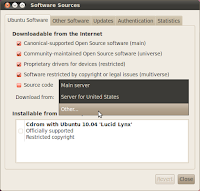
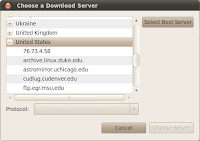
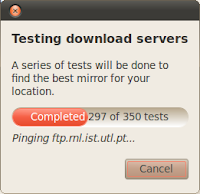
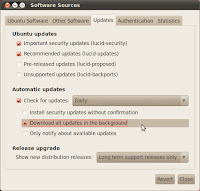
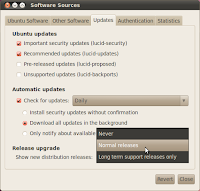
Optionally, jump to the "Updates" tab. If you'll always be running the newest version of Ubuntu and are using third-party repos, which we will be, then leaving the defaults should be fine. "Unsupported Updates (lucid-backports)" gives you, as the name implies, newer but unsupported versions of packages which you probably don't need or even want. Packages may contain new features, introduce new interfaces, and not be sufficiently tested for inclusion in the 'proposed' repository. "Pre-released Updates (lucid-proposed)" is just the testing area for updates, recommended only to those interested in helping to test updates and provide feedback. Check that Ubuntu is scheduled to automatically find available updates daily and to download all updates in the background if you want to save yourself some time when it comes time to install them. You should also change "Show new distribution releases" to "Normal releases" to be notified when the next version of Ubuntu comes out instead of waiting for the next Long Term Support (LTS) release.
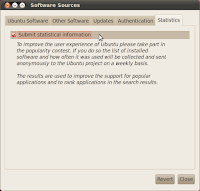 Before you go, head over to the "Statistics" tab and check it if it isn't already. This anonymously sends the list of software you have installed and how often you use them to help collect statistics on which apps are the most popular.
Before you go, head over to the "Statistics" tab and check it if it isn't already. This anonymously sends the list of software you have installed and how often you use them to help collect statistics on which apps are the most popular. When you click close, you will likely be prompted to reload the list of available software. Click reload. If you're prompted with available updates when it finished reloading, follow the instructions to install them. If not, you can always manually check for updates and install them via Update Manager (System ⟶ Administration ⟶ Update Manager). You should always keep your computer up-to-date.
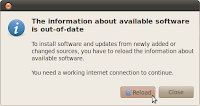
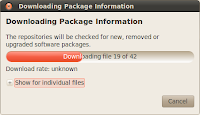
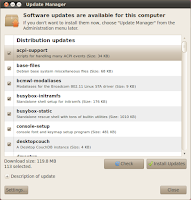
Folder and Printer Sharing

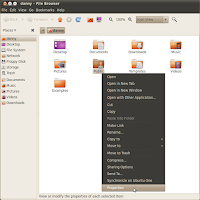 If you want to be able to share files, folders, and printers with Windows machines, you'll need Samba. You can set it up graphically by right clicking on any folder and selecting "Properties" and going straight to the "Share" tab. Check "Share this folder" and you should be prompted to install the Windows networks sharing service. After that's installed, you'll need to restart and you can click "Create Share" to be able to view the folder and it's contents from other machines through the network.
If you want to be able to share files, folders, and printers with Windows machines, you'll need Samba. You can set it up graphically by right clicking on any folder and selecting "Properties" and going straight to the "Share" tab. Check "Share this folder" and you should be prompted to install the Windows networks sharing service. After that's installed, you'll need to restart and you can click "Create Share" to be able to view the folder and it's contents from other machines through the network.
Click here to install samba
Time Synchronization
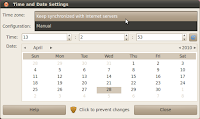
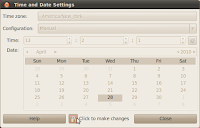 Ubuntu can keep your computer's time accurate by syncing up with atomic clocks through tiers of servers while factoring out communication delays, and adjusting the time without upsetting the other processes that are running. The protocol for this is called Network Time Protocol (NTP). To set up NTP time synchronization graphically, launch Time &Date (System ⟶ Administration ⟶ Time & Date). Click the keys to unlock settings. Now, you can select your time zone, and configure it to "Keep synchronized with Internet servers", at which point it will prompt you to Install NTP support.
Ubuntu can keep your computer's time accurate by syncing up with atomic clocks through tiers of servers while factoring out communication delays, and adjusting the time without upsetting the other processes that are running. The protocol for this is called Network Time Protocol (NTP). To set up NTP time synchronization graphically, launch Time &Date (System ⟶ Administration ⟶ Time & Date). Click the keys to unlock settings. Now, you can select your time zone, and configure it to "Keep synchronized with Internet servers", at which point it will prompt you to Install NTP support.Click here to install ntp

After that, click "Select Servers" and go to http://www.pool.ntp.org/zone/@ to find the address for your country zone (or just use the continent zone if there isn't a specific one for your country) and enter that into the empty field and hit the "Add" button. Make sure it is checked and you can hit close.
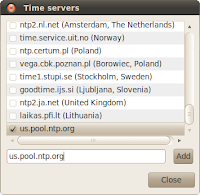
Eye Candy
GNOME Shell
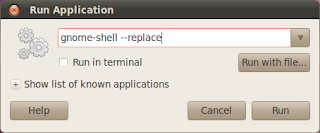 The upcoming version 3.0 of the GNOME desktop environment uses GNOME Shell which is a new interface for interacting with your desktop. If you'd like to try it, there is a version in the Ubuntu repos. Launch it by hitting Alt+F2 to open the "Run Applicatoin" dialog and enter "gnome-shell --replace". Switch back by doing the same thing but enter "metacity --replace" instead.
The upcoming version 3.0 of the GNOME desktop environment uses GNOME Shell which is a new interface for interacting with your desktop. If you'd like to try it, there is a version in the Ubuntu repos. Launch it by hitting Alt+F2 to open the "Run Applicatoin" dialog and enter "gnome-shell --replace". Switch back by doing the same thing but enter "metacity --replace" instead. Click here to install gnome-shell

Simple Compositing
Some of you may not need or want superfluous Compiz visual effects running when you're not making it a point to show them off. Perhaps you lack the hardware or restricted drivers for accelerated graphics necessary for Compiz or maybe you just don't want to use as many system resources but still want basic compositing which some applications depend on. In that case, Metacity, the default window manager for GNOME, works great! You can enable it graphically, or with a simple command, but make sure to disable Compiz effects in Appearance first.
 To enable it graphically, hit Alt+F2 to open the "Run Applicatoin" dialog and enter "gconf-editor" to launch the GNOME Configuration Editor. In the left-hand sidebar, navigate to Apps ⟶ metacity ⟶ general and in the main box check "compositing_manager" which will go into effect instantly. If you prefer the Terminal, you can run this quick command:
To enable it graphically, hit Alt+F2 to open the "Run Applicatoin" dialog and enter "gconf-editor" to launch the GNOME Configuration Editor. In the left-hand sidebar, navigate to Apps ⟶ metacity ⟶ general and in the main box check "compositing_manager" which will go into effect instantly. If you prefer the Terminal, you can run this quick command:gconftool-2 -s '/apps/metacity/general/compositing_manager' --type bool true
Advanced Desktop Effects
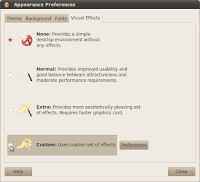 If you want a Custom option in Visual Effects settings in Appearance (System ⟶ Preferences ⟶ Appearance) for some fancier features to play around with and show off, you'll want extra Compiz-Fusion plugins and need a settings manager like Simple CompizConfig Settings Manager or, if you want some extreme customization, Advanced Desktop Effects Settings.
If you want a Custom option in Visual Effects settings in Appearance (System ⟶ Preferences ⟶ Appearance) for some fancier features to play around with and show off, you'll want extra Compiz-Fusion plugins and need a settings manager like Simple CompizConfig Settings Manager or, if you want some extreme customization, Advanced Desktop Effects Settings.APT Line: ppa:compiz/ppa
Click here to install compiz-fusion-plugins-extra
Click here to install simple-ccsm
Click here to install compizconfig-settings-manager

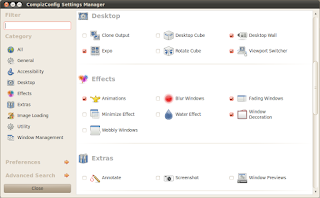

Extra Themes
If you want more themes, there are several packages you can install. Hopefully many of these packages can be merged in the future and have a more refined selection. The themes from the Bisigi Project requires the PPA. You can download individual themes from various websites like GNOME-Look and install them in Appearance.
APT Line: ppa:bisigi/ppa
Click here to install bisigi-themes community-themes gnome-backgrounds gnome-colors gnome-themes gnome-themes-extras gnome-themes-more metacity-themes shiki-colors
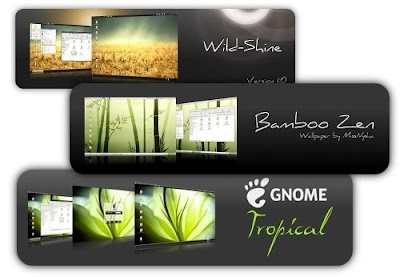
Fractal Screensaver
Electric Sheep displays fractal frames as a screensaver, but on top of that it downloads new popular ones through a distributed computing network so that the "gene pool" of animations, or "sheep" as they're called, is constantly evolving. You can download a starter pack from here and just extract them into ~/.electricsheep
Click here to install electricsheep

Desktop Functionality
Dock
 For a beautiful dock inspired by Mac OS X, try Avant Window Navigator (AWN). It has support for launchers, task lists, and third party applets.
For a beautiful dock inspired by Mac OS X, try Avant Window Navigator (AWN). It has support for launchers, task lists, and third party applets.Click here to install awn-settings
Application Launcher
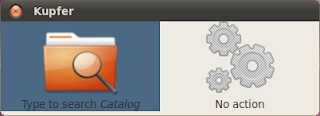 For a simple and lightweight launcher heavily inpired by Quicksilver, Kupfer should do the trick quite nicely.
For a simple and lightweight launcher heavily inpired by Quicksilver, Kupfer should do the trick quite nicely.APT Line: ppa:kupfer-team/ppa
Click here to install kupfer
 For something a little prettier with plugins and a dock, you can also try GNOME+Do.
For something a little prettier with plugins and a dock, you can also try GNOME+Do.APT Line: ppa:do-core/ppa
Click here to install gnome-do
Clipboard Manager
There is an annoying bug from 2004 in which copy/paste doesn't work if the source is closed before the paste. Parcellite is a clipboard manager that works around that problem along with providing some other useful features.
Click here to install parcellite
Universal Applets
After the death of Screenlets and gDesklets, a promising new widget framework called Universal Applets was born with the goal of producing applets that can be dynamically "plugged" into any application. Sadly, the main developer doesn't have time to work on it right now and is currently looking for a new owner. You can still try the early version which is available in a third party repository.
APT line: deb http://download.opensuse.org/repositories/home:/some-guy:/screenlets/xUbuntu_9.10/ ./
Click here to install universal-applets
Web Browsing
Epiphany
Mozilla Firefox feels to heavy for many people. If you want something faster and more standards-compliant, WebKit browsers are the way to go. Webkit is the layout engine that Epiphany and Chromium use to render pages faster than Gecko which is used by Firefox. If you prefer something that integrates more with GNOME, and is in fact the default web browser for it, try Epiphany. You may also add the Epiphany and WebKit PPAs to keep them up-to-date.
APT Line: ppa:webkit-team/epiphanyAPT Line: ppa:webkit-team/ppaClick here to install epiphany-browser
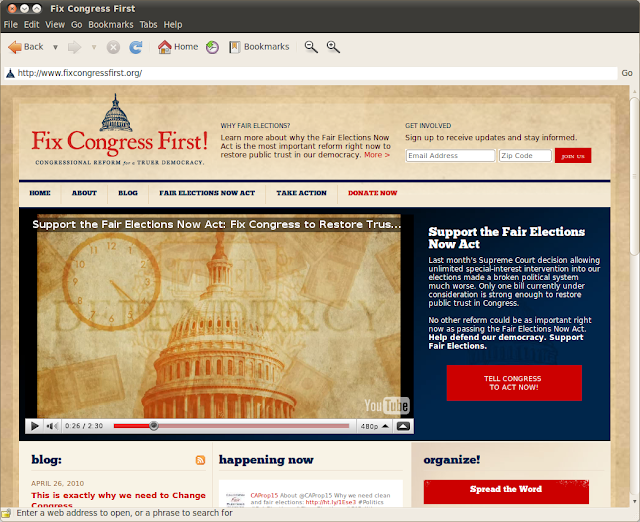
Chromium
Google Chrome is based off of the free software (aka open source) Chromium project. For those of you who need more than what Epiphany currently offers, plugins being a major thing, go with Chromium.
APT Line: ppa:chromium-daily/betaClick here to install chromium-browser
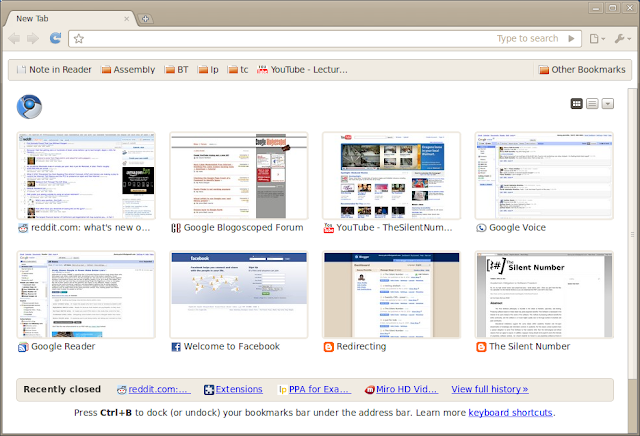
Desktop Webmail
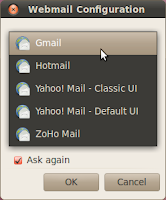
This is going here for lack of a more appropriate section. For those of you who use webmail and prefer that interface over using a desktop application, Desktop Webmail is for you. Now, when you click on email links, you don't be directed to configure your desktop client; you'll be directed straight to your webmail.
Click here to install desktop-webmail
Multimedia Creation & Editing
Audio Recording & Editing
Jokosher is a simple yet powerful non-linear, multi-track audio editor. The interface, which was designed from the ground up, provides an integrated environment to create and record music, podcasts and more.
Click here to install jokosher
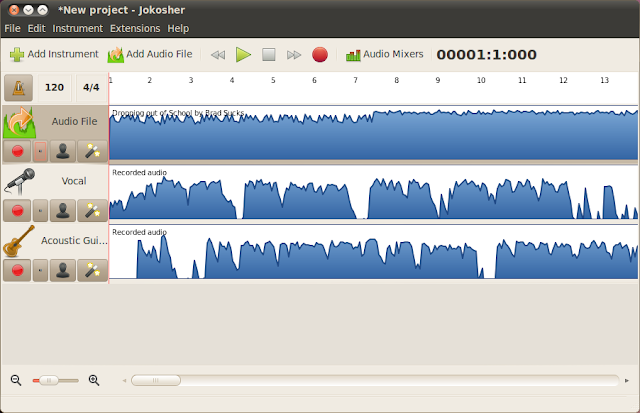
Video Editing
PiTiVi is an intuitive and featureful movie editor that was actually designed with the user interface in mind instead of just slopping on one feature after another. It is able to import and export video files in any format supported by the powerful GStreamer framework. It's now included with Ubuntu by default, but you may still want to add the repository for updates.
APT Line: ppa:gstreamer-developers/ppa
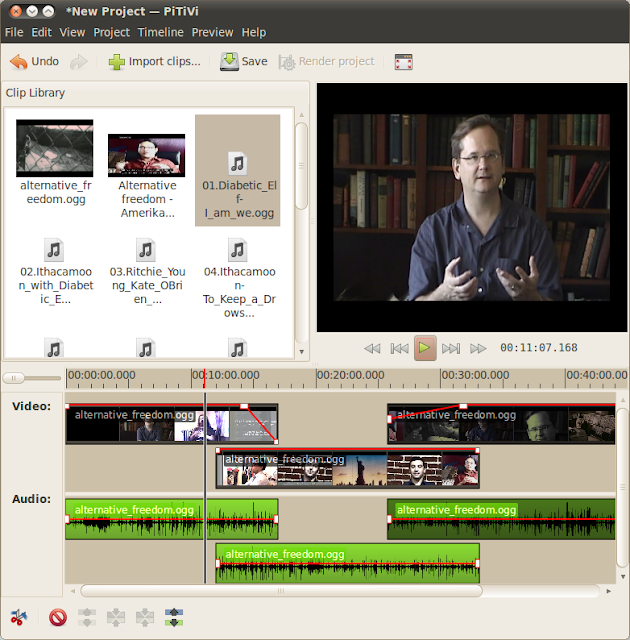
Video Screen Capture
If you want to make screencasts to show off your awesome desktop, Instanbul is a nifty desktop recording tool which, unlike gtk-recordMyDesktop, uses GStreamer. You can install it through Synaptic or Terminal.
Click here to install istanbul
Webcam
If you have a webcam, you need Cheese. It's a Photobooth-inspired application for taking pictures and videos from a webcam also based on the GStreamer back-end.
Click here to install cheese
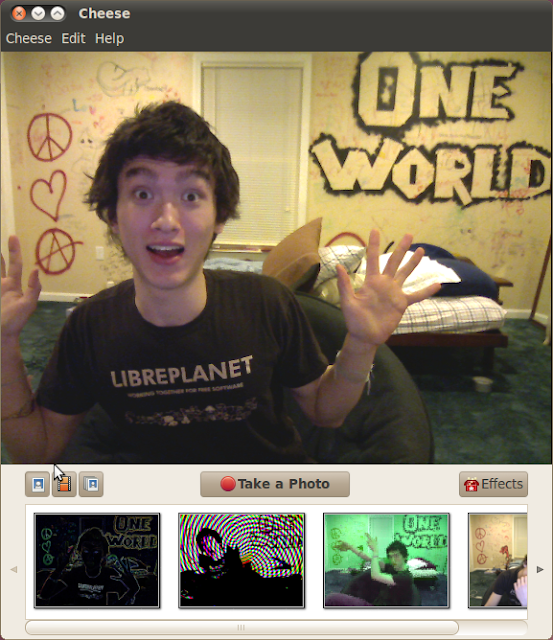
Multimedia Playback
Media Center
Moovida is a beautiful media center which is perfect for setting up a Home Theater PC (HTPC) or TVPC like the Neuros Link and it uses the GStreamer multimedia framework to support playing almost any kind of file.
APT Line: ppa:moovida-packagers/ppa
Click here to install moovida
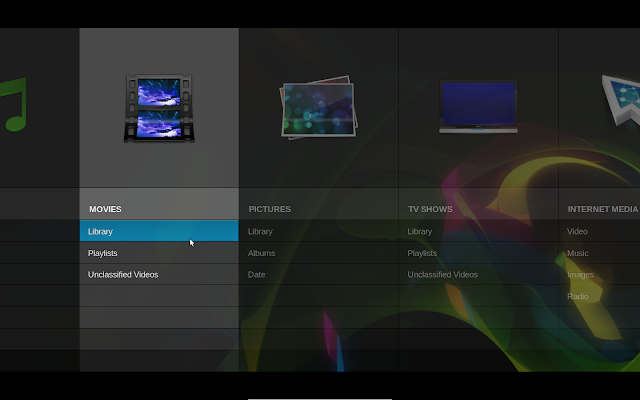
Video Feeds
Miro is an Internet television application developed by the Participatory Culture Foundation whose mission is to "enable and support independent, non-corporate creativity and political engagement."
APT Line: ppa:pcf/miro-releases
Click here to install miro
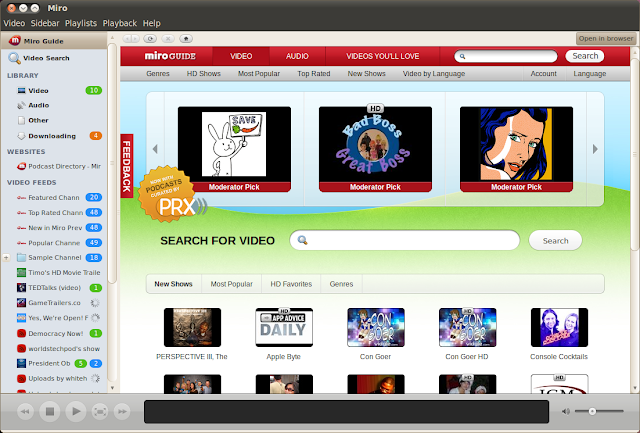
Media Player
Most people are satisfied by Rythmbox, the default music manager for Ubuntu, but if you're not, you may want to try Exaile or Banshee.
APT Line: ppa:exaile-devel/ppa
Click here to install exaile
+-+Exaile.png)
APT Line: ppa:banshee-team/ppa
Click here to install banshee
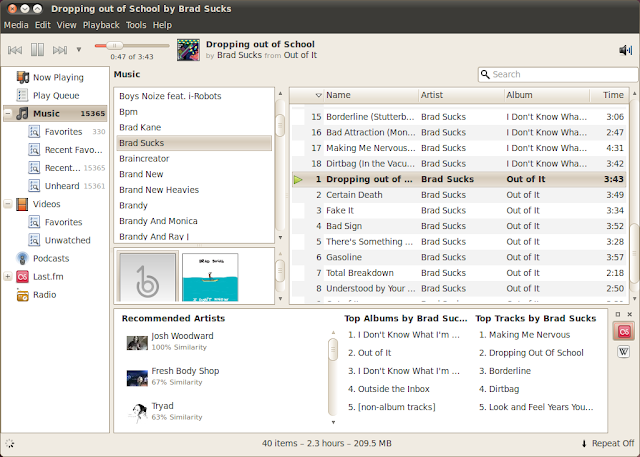
Learning
Brainwave Entrainment
As seen in Linux Journal, you can synchronize your brainwaves to that of an external stimulus like pulses of sound in order to easily induce brain states like sleep for example. Think of it as assisted meditation which is effective at treating conditions like ADD, insomnia, and much more. Gnaural is brainwave entrainment software available through the GetDeb repos. GetDeb can be added to your sources by installing the GetDeb package.
Click here to install gnaural
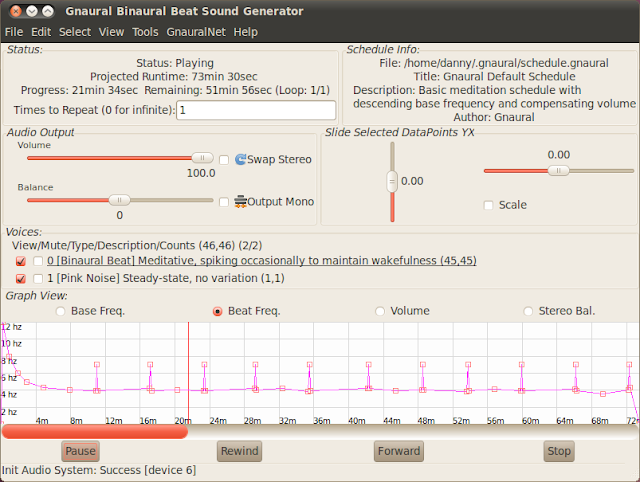
Flash Cards
+-+Anki.png)
Digital flash cards are even more effective because they can accurately use spaced repetition to help you more efficiently retain information. Mnemosyne and Anki are two programs worth giving a try. Anki is not in the Lucid repos but a .deb installer can be downloaded from here.
Click here to install mnemosyne
Time Managment
Getting Things GNOME!
Playing on "Getting Things Done", Getting Thing GNOME (GTG) is a simple yet powerful organization tool built on a very solid set of design principles.
APT Line: ppa:gtg/ppa
Click here to install gtg
Time Tracking
The Hamster Time Tracker applet helps you track and analyze how much time you spend on different tasks and activities with a graphical overview to make you feel bad for all that time you waste. It can only be installed through Synaptic or Terminal.
Click here to install hamster-applet
Alarm Clock
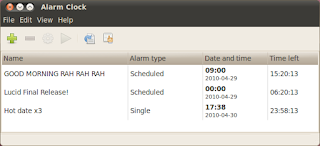 If you keep your computer on at all times and want to toss out your boring alarm clock, or even if not, Alarm Clock provides a lot of nifty scheduling and alert options.
If you keep your computer on at all times and want to toss out your boring alarm clock, or even if not, Alarm Clock provides a lot of nifty scheduling and alert options.Click here to install alarm-clock
Donating CPU Power
Distributed Computing
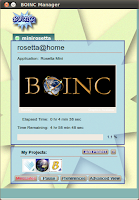
You can volunteer to participate in grid computing and donate your computer's spare CPU power to charitable projects like protein folding. Berkeley Open Infrastructure for Network Computing (BOINC) is a great way to use your computer to give.
Click here to install boinc

Images and Publishing
Photo Management
Sadly, F-Spot was not replaced in Lucid, but on the bright side you get this wonderful section of the guide to let you know of the alternatives. The most promising of which is Solang. It lets you manage your collection of photos by tagging them and searching through them based on various criteria: tags, EXIF data, dates, etc; and offers a limited set of editing functionalities. Solang uses Tracker which allows it to automatically detect all the photos on your computer and publishes the tags all across the desktop. Sorry to tease, but Solang is not packaged for Ubuntu anywhere yet! Will update when available. In the meantime, try gThumb and Shotwell.
APT Line: ppa:nilarimogard/webupd8Click here to install gthumb
.png)
Click here to install shotwell
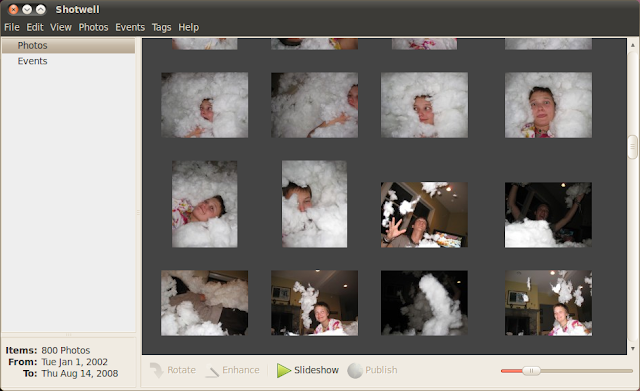
Vector Graphics
Inkscape is an awesome vector graphics editor, with capabilities similar to Illustrator, CorelDraw, or Xara X. It supports many advanced SVG features and puts them into a well-designed interface. Anybody working with vectors needs this tool.
APT Line: ppa:inkscape.testers/ppaClick here to install inkscape
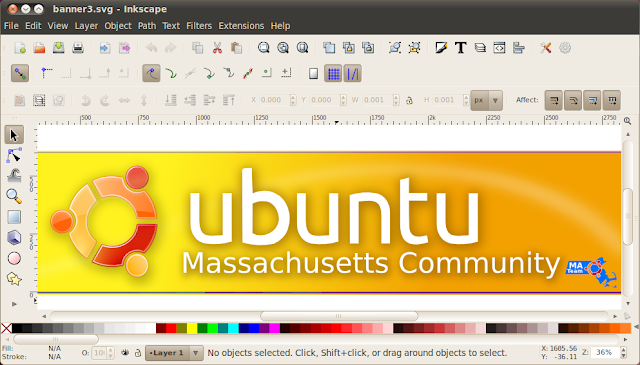
Bitmap Graphics
While GIMP was previously included with Ubuntu by default, it was a bit overboard for what the average user needs. It's still a very useful tool so many of you will probably still want it.
Click here to install gimp
3D Graphics
Not exclusive to still imagery, Blender is an amazing 3D imagery creation suite that has already been used to create films such as the Open Movie Projects.
Click here to install blender

Desktop Publishing
Scribus is a desktop publishing (DTP) application designed for flexible layout and typesetting and the ability to prepare files for professional quality image setting equipment like writing small newspapers, brochures, newsletters, posters and books.
APT Line: ppa:scribus/ppaClick here to install scribus

Games
PlayDeb
What good are games when you're stuck with the same versions for 6 months? PlayDeb is a repository of games which provides you with the latest and greatest that are either not at their newest version in the Ubuntu repos, or not included at all. Installing games is extremely convenient by searching through the PlayDeb.net website and installing games with just a click. You can add it to your sources automatically by installing the PlayDeb package.
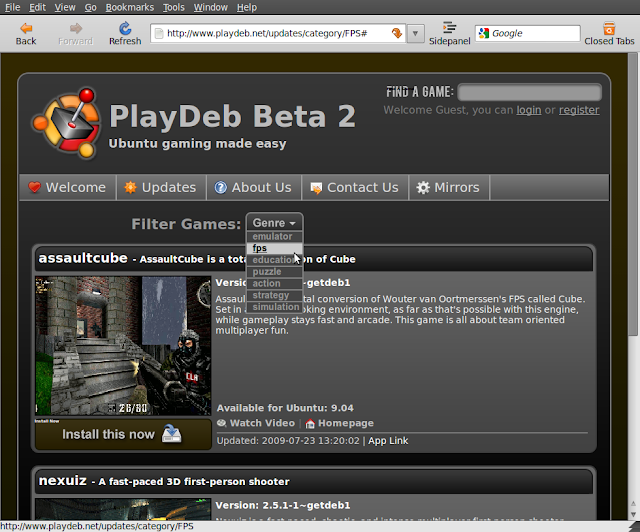
Nexuiz
For those of you who prefer fast-paced first-person shooters, Nexuiz is a very decent Free game every Linux gamer should try at least once. GameStop even held a Nexuiz "PC gaming challenge" in which interactive kiosks were set up in 10 different stores in 8 US cities and users were given 2 minutes to earn the high score for a $100 gift card by doing the most damage possible to their AI opponents.
Click here to install nexuiz
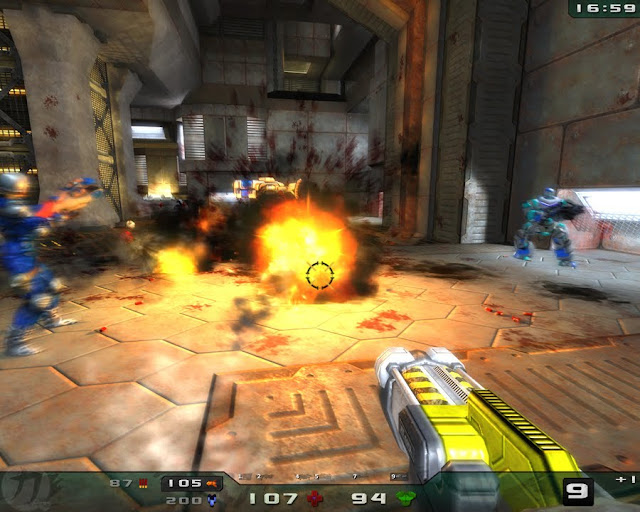
Yo Frankie!
While it runs quite heavily, this is a beautiful and important Free game— that is, free software and free content— which was created with very limited time and resources to show off what can be produced using free software. It was made using Blender, mentioned above, as part of the Blender Institute's first Open Game Project, and based off of the film, Big Buck Bunny, which was the foundation's second Open Movie Project. It validates the viability of free games and is now in the official Ubuntu repos!
Click here to install yofrankie
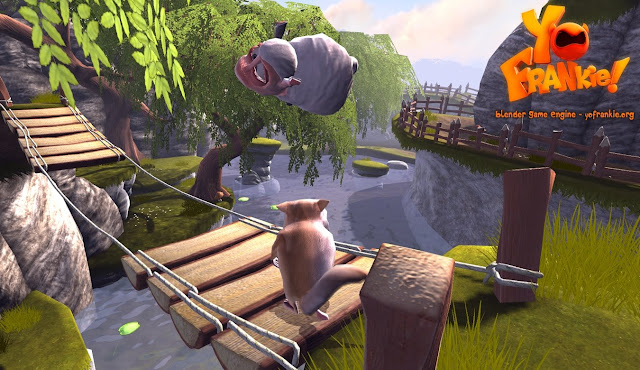
PlayOnLinux
If you desire proprietary games that only run natively on Windows, PlayOnLinux is a front-end for Wine which enables you to easily install many such games.
Click here to install playonlinux
Filesharing
Secured P2P
Gnunet framework for decentralized, secure, peer-to-peer networking for anonymous, censorship-resistant file-sharing. You may have heard of Freenet, but you probably haven't seen how they compare.
APT Line: ppa:teamgnunet/ppa
Click here to install gnunet-gtk
Direct Connect
A great way to share files for students in college networks is using direct connect; sadly, there is no DC client designed for GNOME, nor is there an available port of Shakespeer from Mac, so it seems like the best option is DC++
Click here to install linuxdcpp
Usenet
Although it isn't free, Usenet downloads are crazy-fast and files show up there first. Possibly even more noteworthy, however, is that for whatever reason it remains unregulated by pirate hunters. Read this guide for more info, but install LottaNZB for your client instead— they're working to replace HellaNZB with SABnzbd for their back-end.
APT Line: ppa:lottanzb/ppa
Click here to install lottanzb
BitTorrent
I once recommended Deluge without ever having given Transmission a fair shot. After doing so, it has quickly become my client of choice. If you haven't already, give it a try and you should see how it packs a lot into a clean and simple interface. You may add the repos for updates.
APT Line: ppa:transmissionbt/ppa
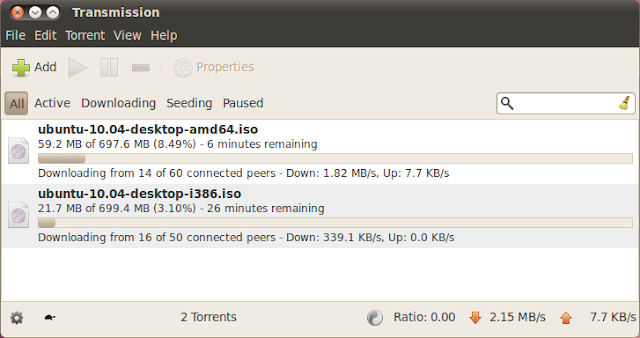
Deluge is always still an option if you still prefer it.
APT Line: ppa:deluge-team/ppa
Click here to install deluge
Communication
Instant Messenger
Horray! Empathy is now included with Ubuntu, but if you want the latest version with additional features like geolocation and audio/video chat for MSN, you'll need to add the Telepathy repos to your software sources.
APT Line: ppa:telepathy/ppa
Microblogging
Gwibber is a cute little microblogging client for those of you who frequently use sites like Identi.ca, Twitter, Jaiku, Facebook, Digg, and more. It's now included with Ubuntu as well, but you can add the repos for updates.
APT Line: ppa:gwibber-team/ppa
System Utilities
Backup
I don't have any strong feelings as to which backup utility you should use, but take it from someone who learned the hard way, you should always have a backup. Back In Time should do everything you need.
Click here to install backintime-gnome
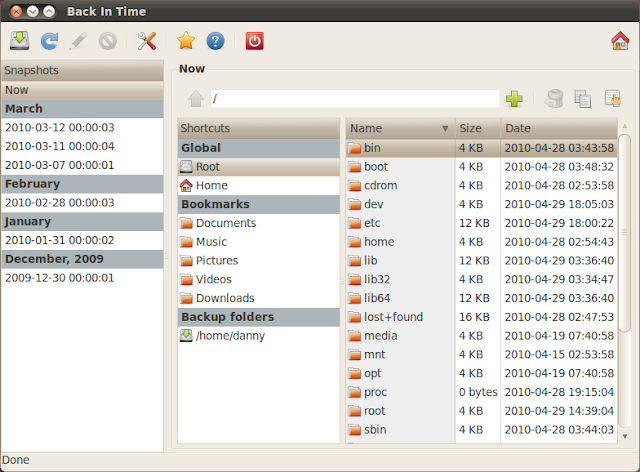
Partition Editor
You can partition you other storage drives, your external hard drive, you USB drive, your iPod, and basically any other writable storage drive you can plug into your computer using the GNOME Partition Editor.
Click here to install gparted
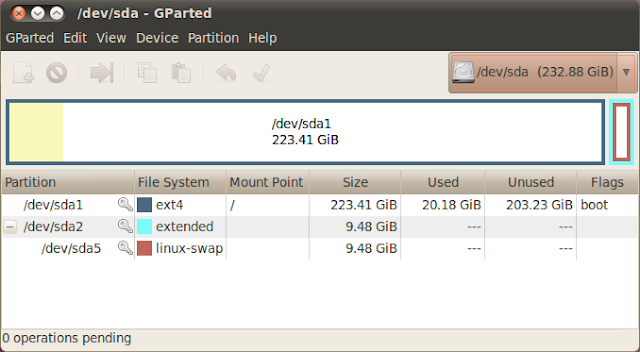
Virtual Machine
If you want to be a good user and get testing on the next version of Ubuntu, that's 10.04 LTS, the Lucid Lynx, but you want to do it safely, get VirtualBox. There's version that is fully open source (vboxgtk), but you'll likely want the proprietary features too. It's installable via Synaptic or Terminal.
The repos requires that you add the security key with this command:
wget -q http://download.virtualbox.org/virtualbox/debian/sun_vbox.asc -O- | sudo apt-key add -APT Line: deb http://download.virtualbox.org/virtualbox/debian lucid non-free
Click here to install virtualbox-3.1

Security & Privacy
Firewall
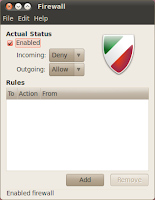 If you feel the need to have a firewall, Firewall configuration is a graphical front-end for Uncomplicated firewall (ufw).
If you feel the need to have a firewall, Firewall configuration is a graphical front-end for Uncomplicated firewall (ufw).Click here to install gufw
Antivirus
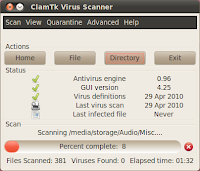
You generally don't need antivirus with Linux, but if you'd like to play it safe, you can install the ClamTK Virus Scanner, a graphical front-end to ClamAV.
Click here to install clamtk
On-The-Fly Encryption
Many people use TrueCrypt believing that it's FOSS, but although the source code is available, it's development is kept secret and it isn't considered Free Software by the FSF nor Open Source by the OSI. ScramDisk for Linux (SD4L) is a great OTFE alternative that also supports TrueCrypt containers. Unfortunately, it is not yet included in the default repos, and there isn't a PPA either, but you can download a .deb to install from their website.
http://sd4l.sourceforge.net/
Onion Routing
If you don't wan't to pay $5 a month for a VPN like IPREDator but still want to be able to use the web anonymously, you can try The Onion Router, more commonly referred to as TOR, but it is significantly slower and requires additional setup. It's available from their repository.
Their repos requires that you add the security key with this command:
gpg --keyserver keys.gnupg.net --recv 886DDD89 && gpg --export A3C4F0F979CAA22CDBA8F512EE8CBC9E886DDD89 | sudo apt-key add -APT Line: deb http://deb.torproject.org/torproject.org lucid main
Click here to install tor-geoipdb
Proprietary & Restricted Software
Nonfree Chromium Codecs
Many HTML5 sites are still using h.264 instead of Ogg Theora, including YouTube. Hopefully this will change soon since Google has acquired On2 and their VP8 codec, but in the meantime, if you'd like to avoid Flash on YouTube with HTML5 video, you'll need to install the codecs.
Click here to install chromium-codecs-ffmpeg-nonfree
DVD Playback
Most commercial DVDs are encrypted with Content Scrambling System (CSS), which attempts to restrict the software that can play a DVD. You'll need to install libdvdcss if you want to play them. You can do so by first installing the libdvdread4 package via Synaptic Package Manager or Terminal.
Click here to install libdvdread4
Then, within a Terminal window, enter:
sudo /usr/share/doc/libdvdread4/install-css.sh
Restricted Extras
The ubuntu-restricted-extras package includes a bunch of things Ubuntu isn't legally allowed to ship with, namely unrar for unarchiving .rar files, Microsoft TrueType core fonts, Sun Java Runtime Environment (JRE), restricted codecs, and finally Adobe Flash Player. Like the rest of the packages and applications in this list unless noted otherwise, it's available in the new Ubuntu Software Center (Applications ⟶ Ubuntu Software Center).
Click here to install ubuntu-restricted-extras
Adobe Flash Player
While it is included in the restricted extras package, you should give a fair chance to Gnash, an open source flash player on the list of high priority Free software projects. To install, you'll first have to make sure you don't have Adobe's flash player installed. You can do this in the Ubuntu Software Center, Synaptic Package Manager, or Terminal with this command:
sudo apt-get purge flashplugin-installer nspluginwrapper
Then you can install the Gnash plugin.
APT Line: ppa:gnash/ppa
Click here to install mozilla-plugin-gnash
For those of you running 64-bit Ubuntu who need the proprietary flash player, Adobe has released the only 64-bit version for Linux! It currently isn't in the repositories because it's still in alpha, but it's still easy to install. Just download the .tar.gz file at the bottom of this page, extract the file to your home folder, and enter this into a terminal window:
sudo cp libflashplayer.so /usr/lib/mozilla/plugins/
Explore, Customize, Personalize!
Now it's time to play around with all the new apps you have and make your desktop, well, yours. You can try experimenting with a cool panel-less desktop; you can explore with all your new apps; you can try different themes and modify them in Appearance; you can set your preferred applications and explore all your system preferences. My desktop background comes is by David Revoy of Sintel, the Blender Foundation's latest Open Movie Project.

Don't forget to show off your shiny new Ubuntu installation to your friends, spread Ubuntu, and contribute to your favorite projects!
My mom was planning on buying an iPad...
I told her if she did, i'd have to move back out (i'm in the process of moving back in). This wasn't quite enough to convince her, so i did some Googling and sent this quick response:
Subject: What iPad? Is that a sanitary device?
iPad - $500-$700Webcam? No. Flash? No. Multitasking? No. USB!? ...No. Freedom? HA!
Damn, even the developers are getting pissed off. And just look at all of the competition that isn't trying to rape their users with digital restrictions management and their developers off of other platforms~
WePad http://wepad.mobi/enComparison: http://wepad.mobi/
OpenTablet 7 http://www.openpeak.com/
TouchBook http://www.
Notion Ink http://www.notionink.in/~$300-500
Vega http://convergeddevices.
MSI Tegra http://www.engadget.com/
Quanta Tegra 2 http://www.engadget.com/
Google's Android/Chrome OS Tabletshttp://www.wired.com/
JooJoo https://thejoojoo.com/Web-tablet (very sleek, but probably not everything you need)
iWonder http://www.be-mine.
iFreeTablet http://www.
And SO MUCH MORE
Taiwan makers displaying 10 iPad cloneshttp://www.pcworld.com/
50 slates to come this year on ARMhttp://www.computerworld.com/
So, you can buy an iPad, which has an Apple logo on it, or you can buy a real computer and stick an ugly apple sticker on it if you like.
Thank you for Ubuntu's success at Anime Boston 2010!
It's hard to believe how well this has all come together. If there's one thing we would like to say coming from this, it's that Ubuntu and other free culture and free software (aka open source) groups need to participate in similar events to reach out to non-techie folks. Any convention more tech-focused than this shouldn't need our presence. Let's go over what we accomplished: live installs, dancing games, free kopibon, and more!
We successfully made Ubuntu highly-visible to thousands of convention goers. We kept hearing from people that our booth was very eye-catching and really stood out! We can thank the Ubuntu MA team leader, Martin (DoctorMO), for the awesome banner and posters we had up. On display, we had four machines by System76: a Starling Netbook, Pangolin Performance, Bonobo Performance, and a 32" HDTV hooked up to another Pangolin Performance under the table. Using the big screen, we lured in the crowed. Blasting techno and showing off crazy compiz-fusion effects, we caught the attention of passersby who were very impressed. It wasn't hard to hear outbursts such as, "Who needs Windows 7!?" and other comments on how awesome the Ubuntu desktop looked. The response we generated was incredible-- people were genuinely amazed!
Over and over, people approached us with great reactions. Lots of them were already using Ubuntu, some knew someone who loved Ubuntu, many had heard of Ubuntu, and just as many were curious to find out what it was! The reactions we received were a testament not only to how far Ubuntu has spread already but also how extremely receptive still-unaware individuals are.
| FireFox posing in front of our booth! |
Many still were the people who came on behalf of someone they knew who loved Ubuntu, grabbing materials and goodies to give them later. Most important to us, though, was everyone who had never heard of Ubuntu but grew excited to learn more upon seeing our display. People took around 500 double-sided flyers about Ubuntu, Free Software (aka Open Source), and the many powerful design tools available: Blender, Inkscape, Synfig, GIMP, and MyPaint. An additional 550 live CD's and 1000 copies of the Ubunchu manga were taken (extra comic books available at request). We even did 5 live-installs, right there at our booth! That number would be higher but people just didn't have their machines with them. Our booth visitors came with curiosity and left eager to pop in their new LiveCDs.
That's not all. Our presence wasn't limited to the Dealer's Room. We also had our flyers and manga on the freebie table and, just like last year, they seemed to be the only thing people were really interested in! If we could've kept up with how fast they were being taken, we could've distributed a lot more. On top of all of this, Martin went up to the Artist's Alley armed with our flyers and talked to everyone up there about all the tools available for their needs. The artists there were very receptive and it definitely helped that we made the effort to reach out to them personally.
This being our first event of this size, we did learn a few good lessons as well, and have some new ideas for the future. You didn't think we were done, did you? Overall, we don't feel there was anything missing, but we've learned a lot about what this kind of project involves and can do even better! Next time we will organize more ahead of time knowing which things require more or less time and be better prepared to handle it all more efficiently. We'll assemble a team earlier on, and give time to go over the good and bad talking points for different kinds of people. It isn't that our booth people weren't amazing; it's that we can always work on perfecting the art of hooking in as many people as we can, as quickly and effectively as we can. One thing which could've been handled better by myself was documentation of the event in pictures and video. There was no way for me to be behind the camera when the booth was at its busiest because I needed to keep the demos going. As a result, all of the pictures in our album are from the quietest times at our booth. I did leave the camera rolling during some periods, so hopefully I'll be able to churn out a decent video with that footage, but next time we will dedicate a lot of time to filming and photographing.
Hopefully this have given you a decent picture of how well everything went. We were even invited to some other conventions! If you have any ideas, want to get involved with the team, or just have questions, please get in touch. This all started out as a little idea, and thanks to the help of many, it grew into the super-successful Ubuntu @ Anime Boston project!
Thank you to everyone who helped:
 |
| YOU! |
Our biggest thanks goes to all of you, the entire community, for all the generous support you've given us with banner hosting, donations, and all the other help we've gotten. None of this would have happened without all your support!
 The beautiful high-quality laptops and netbook lent to us by System76 were an essential part of this event and their help with promotion was invaluable.
The beautiful high-quality laptops and netbook lent to us by System76 were an essential part of this event and their help with promotion was invaluable. 
One thousand flyers courtesy of ProdPromo was one of our most valuable resources at the convention.

Three thousand copies of the Ubunchu Manga in gorgeous quality by Red Sun Press, a truly environmentally friendly worker-owned union shop dedicated to social justice.

Fiscal sponsorship and guidance from Linux Fund helped keep this project going.
LiveCDs, flyers, and other Ubuntu goodies like hats, t-shirts, silly putty, mouse pads, pens, and books from Canonical made our booth complete.
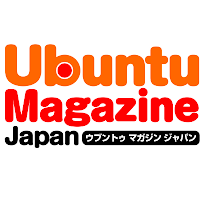 ASCII Media Works provided us with copies of the Ubuntu Magazine Japan which includes the Ubunchu Manga.
ASCII Media Works provided us with copies of the Ubuntu Magazine Japan which includes the Ubunchu Manga.
A huge thank you to Arturo "C-quel" Silva of Pigux for being our biggest donor and providing incredible artwork used throughout our booth.


The Morevna Project covered us in a blog post and provided us a video of production cuts. Synfig, the main tool behind the project hosted a prominent banner on their website.
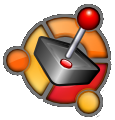

Banners hosted by PlayDeb and GetDeb, the popular third-party Ubuntu repos, have helped raise awareness of our fundraiser.
Academia's Obligation to Software Freedom
So, for my high school senior year project last year, i wrote about...well, i think you get it from the title. I've uploaded it to the Internet Archive here:
http://www.archive.org/details/AcademiasObligationToSoftwareFreedom
You can also just download using these direct links:
Abstract - PDF, ODT
Paper - PDF, ODT
Let me know what you think!
Abstract
The Free Software philosophy is founded in the ideals of freedom, openness, and sharing. Producing software based on these ideals has great pragmatic benefits. Free Software is developed in the interest of its users instead of the owner of the software. This method of producing software benefits the entire community, and the software is of much higher quality due to the huge number of volunteer and paid contributers. Educational institutions support the same ideals within academic freedom and the open dissemination of knowledge and information common in academia. For this reason, school systems have a special obligation to serve Free Software to their students other than the technological and ethical reasons that can apply to anyone. In addition, taxpayer money should not be spent to serve the interests of proprietary software vendors, nor should students be forced to use proprietary software at home in order to be able to get their work done. If students are to be prepared for the future, they should be exposed to Free Software, which continues to gain momentum at an increasing rate. In working with the Newton Public Schools, specifically within Newton North High School, a number of ways to encourage and assist the adoption of Free Software have been considered. The Free Software community can be taken advantage of to gain support from those working within the school system. Once there is support from within, the task of upholding the values of academia by adopting Free Software can soon be achieved.
Academia's Obligationto Software Freedom
The case for Free Software within
educational institutions
By Danny Piccirillo
The Free Software Movement is revolutionizing the way software is made based on the ideals of freedom and openness. The sharing of software is as old as computers themselves, but now it is done in a concerted effort to completely transform the software world, and in fact has spread so much that the same principles are now being applied to content like writing, music, and other artwork, hardware designs, business models, journalism, school systems, and even politics and governance (Definition 2008). The Free Software Movement is built upon the free exchange of ideas, open sharing of knowledge, actualizing goals together, and working in a way that benefits the community as a whole. The parallels between this movement and the role of educational institutions in our society are clear. If schools are true to this philosophy, they have an obligation to be a part of the movement. Speaking with tech staff at Newton North High School and diving into the local Free Software community, I have found a number of ways to encourage and help schools to adopt Free Software.The details of the inner workings of computers may be intimidating to most people, but to understand Free Software, only an easily-grasped, basic understanding of some technical jargon is necessary. These definitions are more than enough for one to be able to fully understand the philosophy of Free Software:
Hardware: The physical, tangible machine (hence, "hard"), components, and devices like mice, keyboards, monitors, printers, and the computer itself, are all examples of hardware. They are the things that either the software runs on, or allow you to interact with the software.Software: Everything that runs on the machine. Microsoft Windows, Mozilla Firefox, and all other programs and operating systems are software. Operating System (commonly abbreviated to OS): The interface between the hardware and user. Ubuntu, Mac OS, and Windows are popular examples. Source Code: All software is made up of code written in programming languages. The code that makes up software is called the source code. Free Software leaves this source code open, as opposed to proprietary software, which keeps the source code secret. Imagine software as a slice of pie. If you can see, modify, and change the recipe, it's Free. If not, it's proprietary. Copyleft: The ingenious method of using copyright law to prevent copyright restrictions. It grants permission to use, modify, and share, as long as derivatives preserve the same freedoms.GNU (Gnu's Not Unix): Refers to the GNU Project, an effort to make a Free operating system based off of Unix, a style of operating systems, or to the GNU Operating System itself. Linux Kernel: If operating systems, like Windows, were apples (the fruits), the kernel would be the core. Linux is the name of the core of the GNU/Linux Operating System. GNU/Linux: Commonly called Linux, refers to the family of Linux-based distributions. Distributions are like different flavors of the GNU/Linux OS, the most popular being Ubuntu.
The Free Software Definition, first published in 1986 by Richard M. Stallman, founder of the Free Software Foundation, lists the four fundamental freedoms any piece of software must have to be considered Free:
The freedom to run the program, for any purpose (freedom 0)
The freedom to study how the program works, and adapt it to your needs (freedom 1)
The freedom to redistribute copies so you can help your neighbor (freedom 2)
The freedom to improve the program, and release your improvements to the public, so that the whole community benefits (freedom 3)
Bibliography
Stallman, Richard M. 2002. Free Software, Free Society: Selected Essays of Richard M. Stallman. Boston, Massachusetts. GNU Press. http://www.gnu.org/philosophy/fsfs/rms-essays.pdf (accessed May 6, 2009).Moody, Glyn. 2008. Interview: Mark Shuttleworth, founder of Ubuntu. http://www.guardian.co.uk/technology/2008/may/22/internet.software (accessed May 13, 2009).
Wheeler, David A. Why Open Source Software / Free Software (OSS/FS, FLOSS, or FOSS)? Look at the Numbers! http://www.dwheeler.com/oss_fs_why.html (accessed May 8, 2009)
Deshpande, Amit and Dirk Riehle eds. 2008. The Total Growth of Open Source. http://dirkriehle.com/2008/03/14/the-total-growth-of-open-source/ (accessed May 10, 2009).
O'Reilley, Tim. 1999. Ten Myths about Open Source Software. http://www.oreillynet.com/pub/a/oreilly/opensource/news/myths_1199.html (accessed May 10, 2009).
Asay, Matt. 2009. Facts behind Microsoft's anti-Linux campaign. http://news.cnet.com/8301-13505_3-10145332-16.html (accessed May 2, 2009).
Vessels, Terry. 2001. Why should open source software be used in schools?http://edge-op.org/grouch/schools.html (accessed May 8, 2009).
Wikipedia contributors. 2009. Comparison of open source and closed source. Wikipedia, The Free Encyclopedia, http://en.wikipedia.org/w/index.php?title=Comparison_of_open_source_and_closed_source&oldid=261647655 (accessed January 2, 2009).
Definition of Free Cultural Works contributors. 2008. Definition. http://freedomdefined.org/index.php?title=Definition&oldid=5437 (accessed May 16, 2009).
Raymond, Eric S. 1997. Release Early, Release Often. http://www.catb.org/~esr/writings/cathedral-bazaar/cathedral-bazaar/ar01s04.html (accessed May 15, 2009)
Navigation: Home | 1 | 2 | 3 | 4 | 5 | 6 | 7 | 8 | 9 | 10 | 11 | 12 | 13 | 14 | 15 | 16 | 17 | 18 | 19 | 20